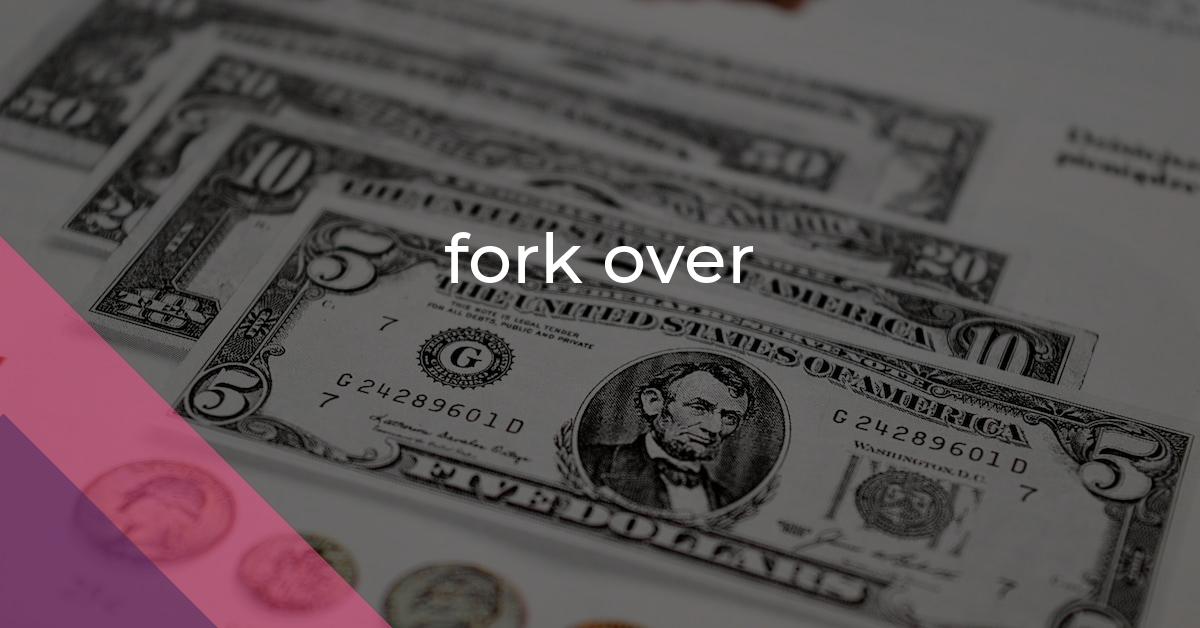fork over: Idiom Meaning and Origin
What does ‘fork over’ mean?
The idiom "fork over" means to reluctantly give or hand over something, typically money or possessions, often under pressure or unwillingly.

Idiom Explorer
The idiom "turn over" means to flip or rotate something, or to change one's position or occupation.
The idiom "lend a hand" means to offer assistance or help someone with a task or problem.
The idiom "in for a penny, in for a pound" means that once you commit to doing something, you might as well fully commit and go all the way, regardless of the cost or consequences.
The idiom "here you are" is used to hand something over to someone or to guide someone to a specific location.
The idiom "have one's hand out" means to ask for money or help from someone, usually in a demanding or pushy manner.
The idiom "have one's hand in the till" means to be illegally involved in stealing money from one's own workplace or organization.
The idiom "hat in hand" means to be humble or submissive, often after a failure or when seeking forgiveness or help.
The idiom "fork off" means to divert or deviate from a path, plan, or topic of discussion. It implies the act of taking a different direction or pursuing an alternative course of action.
Unveiling Symbolism
The idiom *fork over* has a close relationship with two other idioms: *cough up* and *fork off*. *Cough up* is another slang phrase that means to pay or hand over something, often used in a negative or reluctant context. It shares a similar connotation with *fork over*, suggesting that the act of payment or transfer is done unwillingly or under duress. On the other hand, *fork off* is an informal expression used to tell someone to go away or leave, indicating a sense of dismissal or rejection. While *fork over* and *fork off* are not directly related in meaning, they both involve the use of the word "fork" in a figurative or non-literal sense.
When discussing the idiom *fork over*, it is important to note that it is primarily used in informal and colloquial contexts. The phrase is often employed in everyday speech and informal writing, reflecting its status as a common slang expression. Its prevalence in casual communication adds to its accessibility and familiarity among native English speakers.
The figurative nature of the idiom *fork over* allows for the exploration of various symbolic interpretations. The act of handing over a fork, which is used to transfer food from a plate to one's mouth, represents the idea of transferring or surrendering something. This imagery adds depth and visual appeal to the phrase, enhancing its impact and resonating with the reader or listener.
In terms of style and tone, *fork over* lends itself well to a conversational and friendly approach. By using simple words and phrasing, the idiom creates a sense of approachability and ease, allowing the reader to quickly grasp its meaning. The choice of a conversational style aligns with the idiom's colloquial nature and enhances its relatability to a well-informed audience.
The idiom *fork over* can be traced back to its origin in the late 19th century, a period marked by the emergence of slang and colloquial language. It likely gained popularity among working-class individuals who used it as a form of resistance or expression of discontent. The phrase's informal nature and vivid imagery contributed to its enduring usage and integration into everyday speech.
In the context of the United States, *fork over* holds particular significance. The phrase embodies the American spirit of individualism and defiance against authority. It is frequently employed to describe situations where individuals are compelled to pay a significant amount of money or relinquish something against their will, such as taxes, fines, or debts. Its usage reflects the sociocultural dynamics surrounding the act of giving or yielding.
Examining the idiom *fork over* opens up a range of possibilities for further exploration. The psychological aspects of coercion and reluctance in the act of payment or transfer present avenues for research and analysis. Additionally, investigating potential regional variations or nuances in meaning within different parts of the United States would provide valuable insights into the idiom's usage and implications.
*Fork over*, *cough up*, and *fork off* are idioms that share a commonality in the use of the word "fork" in a figurative sense. While *fork over* and *cough up* are related in meaning, both implying an unwilling or reluctant act of paying or handing over something, *fork off* conveys a sense of dismissal or rejection. Together, these idioms contribute to the rich and dynamic landscape of English idiomatic expressions.
Example usage
- "I had to fork over $200 to fix my car after the accident."
- "The company asked its employees to fork over their personal cell phone numbers."
- "If you want me to lend you the money, you'll have to fork it over by the end of the week."
More "Payment" idioms



